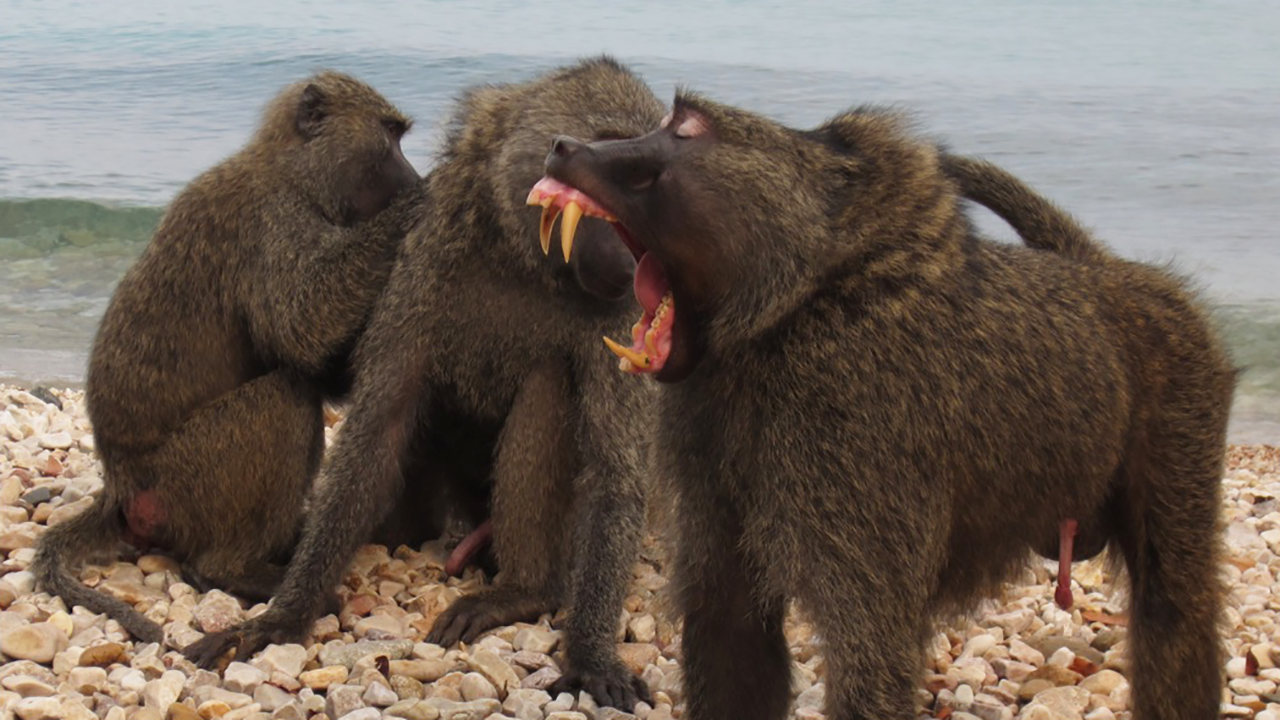
In some mammals, notably lions, invading males induce lactating females to return to a receptive state—estrus—by killing their cubs. That often works because taking over a pride means evicting resident males that would have defended the cubs.
In baboon troops, however, incoming males don’t so much invade as immigrate. Many resident males stick around and will defend their offspring against infanticide by newcomers, so immigrant males must pursue a different strategy to create mating opportunities.
In a new study, University of Minnesota researchers have discovered strong evidence that immigrant male olive baboons akin to human social climbers—“rapidly rising males”—benefit from inducing miscarriages.
“We suspect that high-quality males that ascend rank quickly are the only ones that would really benefit from inducing miscarriage, and that the benefits are highest if they target high-ranking females,” said Andrea Bailey, a biology teacher in Massachusetts who led the work as a doctoral student in the UMN College of Biological Sciences under Professors Craig Packer—a coauthor of the study—and Michael Wilson. “In multi-female primate groups, the offspring of dominant females enjoy higher survival and earlier maturation of daughters.”
If an incoming male causes a dominant female to miscarry, she will enter estrus sooner. If he can then father offspring with her, he will reap an evolutionary benefit because the offspring will more likely survive to breed—and in the case of daughters, breed sooner—than the offspring of lower-ranking females. Thus, high-ranking females are the most profitable targets for feticide (induced miscarriage) or infanticide.
The researchers studied olive baboons in Gombe National Park, Tanzania, where birth and miscarriage data from 1972 to 2002 is available. The study is published in Scientific Reports.
Beware New Rapidly Rising Males
Female olive baboons can be induced to miscarry relatively easily; harassment in the form of a stressful chase or a well-placed bite wound can do it. The study showed that females wounded during pregnancy suffered significantly higher hazards of miscarriage, and that pregnant females suffered a disproportionate number of wounds after the arrival of a male that rose to top rank within a year, as compared to females not exposed to such a male.
Most telling was the strong, statistically significant connection between miscarriage risk and the combination of higher female rank and exposure to males that quickly rose to top rank. This connection occurred in non-drought conditions and strengthened as the two-year mean rainfall rose.
Since rainfall amounts are a stand-in for food abundance, the data points to a strong pattern: when food is abundant, high-ranking females exposed to rapidly rising immigrant males run a higher risk of miscarriage. Only this combination of factors was statistically significant; given either low rainfall, lower maternal rank, or exposure to just “any immigrant males,” the higher miscarriage risk disappeared.
In fact, when the two-year mean rainfall dropped below about 1050 millimeters (1.05 meters, or 41 inches), the miscarriage risk became higher for the lower-ranking females. And the gap widened with intensifying drought and food shortages.
“Low-ranking females may miscarry in response to generalized social instability when coupled with intense feeding competition, thereby masking any effects from female rank,” Bailey said.
What’s in It for Males
Infanticide did not emerge as a recurring strategy in the male olive baboons. The researchers reason that they have more to gain from feticide than infanticide. For one thing, it’s much easier and less risky to harass a female than to snatch a baby from her back—or the arms of its father.
Also, the penalty for not committing feticide outweighs the penalty for not committing infanticide. Foregoing feticide forces a male to wait for a female to finish pregnancy and lactation before she becomes fertile again. But foregoing infanticide means a shorter wait, and thus a lesser loss of male reproductive potential. Therefore, the benefits of feticide should outweigh those of infanticide, especially given the risks of the latter. This may have led feticide to become the more strongly selected behavior for male olive baboons.
“Further observational evidence is needed to confirm whether they selectively target high-ranking females,” Bailey noted.
“This research suggests a new twist to the Battle of the Sexes, where the ‘best’ males (those capable of a rapid initial rise in dominance rank) may focus their most destructive behavior on the ‘best’ females (those with the fastest reproductive rates),” she added. “The intersection of rank, environmental stress, and exposure to new males emphasizes the value of adopting a more nuanced evaluation of the reproductive conflicts between males and females.”